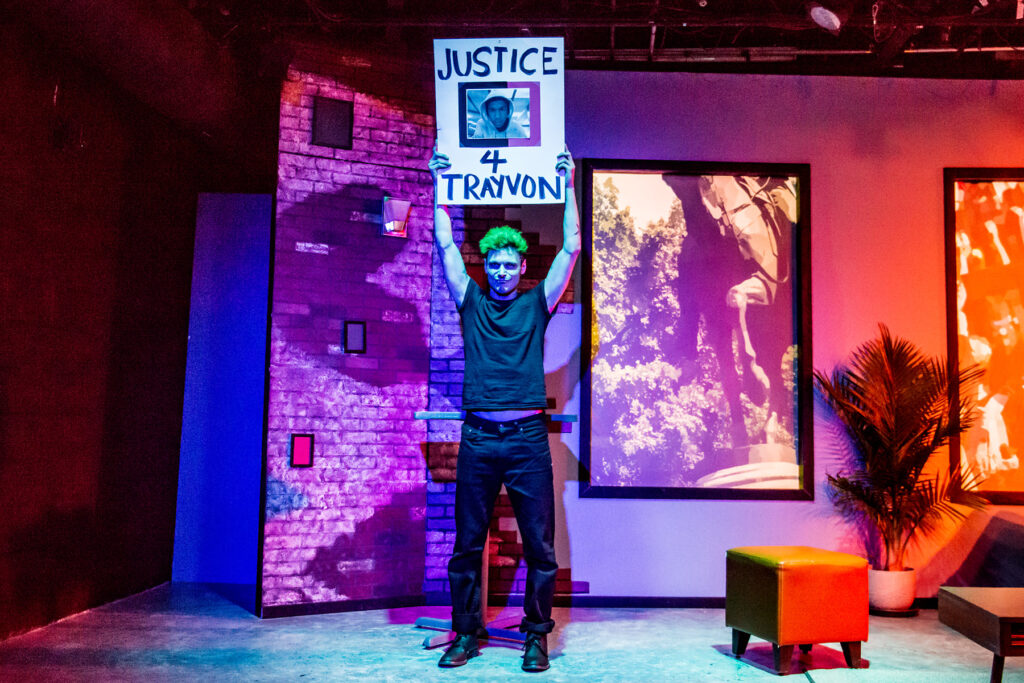[NOTE: This production was made Covid conscious with the show at a reduced 20 seat capacity and following CDC guidelines. Due to the Covid-19 pandemic, and a few poorly timed ice storms, I conceded my in-person tickets for a video-on-demand version of the play. It didn’t make too much difference in the viewing experience, though I was afforded the luxury of pausing the show for a restroom break or two.]
To make an analogy, This Bitter Earth was a 90 minute waterslide, a long line to the top, an exciting trip down, and an unfortunate splash into the shallow end leaving you longing for the slide you just shot out of. It tells the story of Jesse (played by Andrew “Rou” Reid), a black playwright, whose apathy towards the Black Lives Matter Movement is called into question by his white boyfriend Neil (played by Evan Nasteff). The story starts on a slower note, I found myself checking the time stamp every few minutes to see how far along I was. However, it does start on an interesting note; Jesse begins with a monologue said directly to the audience. Neil appears, interrupts Jesse, and becomes a vignette where the two engage in a drunken, oddly sweet conversation, interrupted by a loud crash. This scene is repeated, beat by beat, at least three or four times throughout the play, each time offering the audience a bit more context into what is being said, a device that helps define their relationship and develop intrigue. The pacing feels off the entire play and I believe it has to do with its structure, as the whole play is vignettes strung together in what seems to be out of chronological order however it’s not made clear.
The appeal of This Bitter Earth ignites in the middle, the vignettes start to spark more thought-provoking questions like what it means to be more passive towards the BLM movement as a black person, white guilt/white savior complex, or being someone’s first black partner. Though fascinating, I wish the topics were expanded on, this is not seen often in entertainment media and I commend writer Harrison David Rivers on nailing the exploration into them. Despite that, the ending made me want to stop the play entirely, it felt clunky, rushed, and overall let me down from such an amazing middle portion. Neil betrays Jesse in such a mind-boggling way that leaves the viewer completely stupefied as to what Neil’s motives are. Underscored by the fact Jesse, completely broken, forgives and begs Neil, who appears to have moved on, to come back into his life. For the final nail, the story closes with an ending pulled straight out of Rent, Falsettos, Brokeback Mountain, or most any other queer-focused property. The ending’s outdated, out of place, and outright cliched to death, but also doesn’t evoke sympathy from the viewer considering the magnitude of Neil’s betrayal and its placement in the narrative. Plot-wise This Bitter Earth left much to be desired, though the play’s appeal comes less from the story and more from the characters and their purpose thematically.
Andrew Rou Reid hits a home-run with his portrayal of Jesse, how he balances Jesse’s apathy towards the BLM movement is something I found fascinating. Many of the complex thoughts Jesse/Andrew worked through on-stage made his character sympathetic, relatable, and charming. In my favorite scene Jesse recounts a dream and wholly and utterly sums up this character’s entire being in a monologue done directly downstage. Neil I found harder and harder to like as the story continued. Unfortunately, about forty-five percent of Neil/Evan’s dialogue was the word “fuck”. Understand, I have no aversion to the word nor any naive ideals on adult language, however, the repetitive usage had me drawing comparisons to the plays in high school where the characters would swear because they could. I felt as though Evan’s portrayal of Neil had little contrast in terms of energy, there were too many high energy moments with few subdued ones. What repelled me from Neil as written was his reaction to Jesse’s feelings on the racial issues he was facing. I think the play wanted to pitch these characters as two sides of the same coin, but, in light of recent BLM activities, that choice seems quickly outdated in assessing Jesse’s attitude to the BLM movement.
Overall the themes the story explored were more intriguing and deserved more attention than the arc of Jesse and Neil’s relationship. Jesse and Neil were in so much conflict throughout the piece you’re left wondering why they were together in the first place. In every other vignette they were at odds, and had the story focused on the nuances of interracial dating as opposed to the false dichotomy of apathetic black person and white “super ally” the narrative would have been more cohesive.
Harrison goes as far as having Jesse say “All Lives Matter” which in recent context is an excruciating thing to hear out of a black person’s mouth. Despite these feelings, Jesse is a conscious enough black person when calling Neil on his white-centric behaviors causing the entire dichotomy to fall flat and leads the crux of the story into question. I would say I was blown away but I just wasn’t, This Bitter Earth felt more like a study in race and queer theory, than a play about a relationship. A relationship where upon watching doesn’t make sense and plays out as a theatrical exploration into interracial dating.
At: Richmond Triangle Players, 1300 Altamont Ave, Richmond, VA 23230
Performances: Onstage Jan 28 – Feb 20, 2021, On Demand beginning Feb 13, 2021



